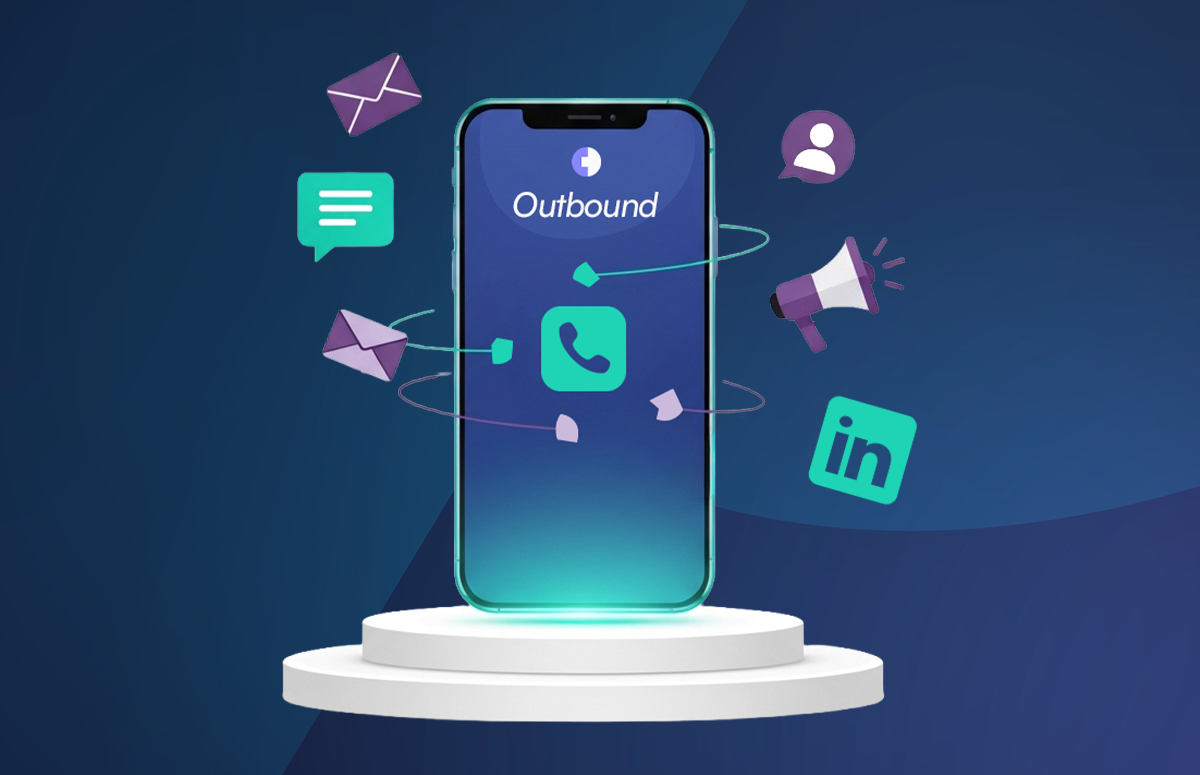Stress in Sales? Combat It With 10 Actionable Tips
Tips to handle stress in sales:
Sales is a high-pressure environment.
From meeting stringent quotas to navigating rejections to managing a demanding workload, it’s no wonder salespeople often feel the weight of it all.
There’ll always be stress in sales, but there are things you can do to combat it.
In this guide, we’ll discuss some practical actions you can take to manage stress and perform at your best without burning out.
Let’s get started 👇
Why is sales such a stressful job?
We’ve all been there.
Being stressed but not understanding why.
But asking this question is a useful place to start. Understanding why we’re feeling stressed can help us handle the pressure in the first place.
This is important for B2B sales because the causes of sales rep stress aren’t always the same.
It could be down to one thing for one SDR and a mix of things for another.
It’s like a snowball effect, as Ryan Reisert of Reisert Consulting told us:
“Sales is always on. It’s not a role where you can just clock in and out. There’s no end in sight - it’s a constant journey.”
“There’s a constant loop of obstacles. And then the more success you have, the more it stacks up.”
So, while many factors contribute to stress in sales, the following are the most significant:
Constant pressure to meet quotas
Salespeople live and die by their numbers.
One of the most significant stressors is the relentless pressure to hit daily, weekly, or monthly sales targets.
Missing those targets can lead to reduced income or even job insecurity, creating a never-ending cycle of anxiety.
Rachel Goldstone, former Director of Sales Development at Cognism, said:
“Within a sales environment, it’s very target-driven. Numbers don’t lie. So if your metrics aren’t there, it’s stressful.”
Dealing with rejection
Rejection is an everyday reality in sales.
Whether it’s a lost deal or a prospect ghosting you, the sheer volume of “no’s” can damage confidence and motivation.
Over time, constant rejection can lead to feelings of frustration and self-doubt.
Unpredictable income
Commission-based pay structures mean a salesperson’s income can fluctuate wildly.
One month can be highly profitable, while the next might leave you short on rent.
This financial instability adds significant stress, especially for those who have families or big financial commitments.
Balancing client demands
Juggling multiple clients with unique needs and expectations can be a daily struggle.
Trying to keep everyone happy while closing deals is like walking a tightrope - and the pressure to stay responsive and engaged around the clock can be exhausting.
Lack of control over outcomes
Even the best sales reps can fail due to factors outside their control, such as economic downturns, changes in client budgets, or market shifts.
This lack of control can feel profoundly frustrating and stressful, as external forces can upend months of hard work with no warning.
10 actionable tips to reduce sales stress
Now you know what can cause stress in outbound sales. But what steps can you take to combat it?
Here’s a list of highly useful strategies you can use to reduce sales pressure and bring more enjoyment to your role:
1. Focus on healthy habits
The key to managing sales stress involves prioritising your physical and mental well-being.
Many people neglect wellness due to the pressure of their jobs, but it’s one of the easiest ways to combat the stress of a sales role.
Joshua Lord, Senior AE at Airtable, shared how important this has been for him:
“I work out either before or after work. Doing something physical is key, whether it be running or swimming. I’ve also been getting into meditation recently. It does clear the mind.”
Physical activity releases endorphins, which naturally improve mood and concentration.
If your daily routine is dominated by poor sleep, unhealthy food, and too much caffeine, you’re setting yourself up for fatigue and stress overload.
Regular exercise, a balanced diet, and mindfulness practices are essential in building resilience to stress.
For Rachel, this has meant journaling:
“I started journaling after around six months. I’d wake up in the middle of the night and feel stressed.”
“So I’ll write down a stream of consciousness for around 30 minutes, focusing on how I will fix why I’m feeling stressed.”
Mindfulness techniques like meditation or deep breathing create mental space, making it easier to stay calm in high-pressure situations.
Key actions:
- Schedule daily workouts, even if it’s just a walk around the block.
- Incorporate healthier meals into your diet to keep your energy steady throughout the day.
- Try meditation or breathing exercises to clear your mind and reduce stress.
2. Take regular breaks
B2B sales is a profession where it’s easy to feel like you need to be “on” all the time.
But constant working without breaks can backfire, leading to fatigue and decreased sales productivity.
After all, we’ve all suffered from Zoom brain, blue light headaches, etc.
Josh and Ben Green, Senior Account Executive at Luminance, recommend taking regular breaks away from the screen.
While it seems simple, regular breaks are a proven method for maintaining focus and reducing sales stress throughout the workday.
A five-minute break to stand up, stretch, or take a quick walk can help refresh your mind.
Over time, this habit will improve your focus and energy levels, making it easier to handle the demands of your role without feeling constantly overwhelmed.
So, this is your gentle reminder not to stare at your screen constantly!
Stretch your legs and get a coffee. Because that Salesforce report you’ve been staring at for the last couple of hours isn’t going to change or disappear. It’ll be there when you’re back!
Key actions:
- Follow the 25-5 rule: work for 25 minutes, then take a 5-minute break.
- Use your breaks to stretch, hydrate, or take a short walk to reset your mind.
- Schedule longer breaks during your day for meals or mental relaxation.
3. Stay organised
This is the number one priority for Ben:
“The best way to avoid stress is to stay as organised as possible. Because the minute you forget to write down notes from every call or notes to call someone back at a specific date and time, it’s all over.”
Disorganisation is a major source of stress in sales.
When your tasks, leads, and to-dos are scattered, you easily feel overwhelmed. On the flip side, staying organised helps you stay on top of your workload and ensures you move forward in a structured way.
Never underestimate the power of a simple notepad and pen. For something more hi-tech, Ben recommends Outlook Calendar or ScratchPad.
Tools like CRM systems, task managers, and calendars can streamline your process and help you maintain control.
What’s the benefit of this?
Keeping detailed notes on every interaction with a client prevents you from scrambling for information at crucial moments. A clear plan will help you stay on top of your sales workflow and stop stress from sneaking up on you.
Ben also shared a piece of advice from his mentor that has stuck with him:
“To lead your most stress-free life in outbound sales, you’ll want to hit your target in the third week of the month, and then you’re not leaving it until the last week.”
“Then, in the fourth week, you can focus on prepping for the month ahead. It’s about frontloading for the following month, so you’ve always got meetings booked.”
Bottom line: always be ahead of the game!
Key actions:
- Use a CRM system to track all client interactions and follow-ups.
- Keep a to-do list or use a task management system to prioritise your daily sales activities.
- Organise your workspace to eliminate distractions and improve focus.
4. Don’t overdo it
Sales can sometimes feel like a race to outwork everyone else - more cold calls, more emails, more meetings.
But pushing yourself too hard can lead to burnout and diminished returns.
Recognising when enough is enough and pacing yourself for long-term success is crucial.
The pressure to perform can often lead salespeople to work longer hours, but success in sales is about working smart, not just hard.
Set limits on your work hours to avoid the temptation to grind yourself down; instead, work on maintaining a sustainable pace.
Remember to ask for help if you need it. Your manager’s responsibility is to coach and help SDRs with stress.
Rachel said:
“If someone in your team is stressed, sometimes you don’t need someone to fix their problem. They just need someone to be there, to listen.”
Ryan said it’s essential to be compassionate:
“When you’re in the 1-2-1s, don’t just focus the discussion on metrics. Ask questions like ‘how are you doing?’ Because everyone has stuff going on in their personal lives.”
Key actions:
- Set realistic daily work limits and stick to them.
- Learn to say “no” to tasks that may overload your schedule unnecessarily.
- Take time to reflect on your achievements and give yourself credit for progress.
- Ask your sales manager for help.
5. Automate as many tasks as you can
B2B sales can be full of time-consuming and stressful administrative tasks.
Manually sending follow-up emails, scheduling meetings, and inputting data into your CRM can quickly eat into your day. Automating as many repetitive tasks as possible will free up your time and reduce stress.
Sales automation tools like HubSpot, Salesforce, and Zapier can be your best friends.
Here are some automation ideas:
- Set up automated follow-up sequences that send emails after specific touchpoints.
- Use a meeting scheduler app to arrange meetings and demos without back-and-forth emails.
- Create workflows that automatically update contact records.
- Additionally, use a data vendor like Cognism or Lusha to create accurate contact lists quickly.
Cognism, in particular, offers unrestricted access to data, so you don’t need to worry about using up all your credits.

“Since onboarding Cognism, my team’s connect rates have increased, we have saved about 10 hours a week and have generated 161 opportunities in under 3 months.”
Key actions:
- Use a data provider to help build quality, B2B lists.
- Use an email automation tool to send follow-ups and reminders.
- Set up automated workflows in your CRM to handle lead nurturing.
- Use a scheduling app like Calendly to streamline meeting bookings.
6. Take your annual leave
Many salespeople fall into the trap of not taking their holidays or time off, thinking it will hurt their performance.
Regular time off is essential for maintaining mental health and reducing stress. Annual leave gives you a chance to recharge, clear your mind, and return to work feeling refreshed and focused.
Josh said:
“It’s so important to take a holiday. Go somewhere where you’re not on your phone, Slack, or the computer.”
Time off reduces stress; studies have also shown that employees who take regular vacations are often more productive and effective when they return to work.
Key actions:
- Schedule your annual leave well in advance and stick to it.
- Disconnect completely during vacations. No checking emails or Slack!
- Use your time off to do activities that genuinely relax and recharge you.
7. Break your workload up into manageable tasks
It’s easy to feel overwhelmed when your to-do list is long and filled with large, complex tasks.
Breaking your workload into smaller, manageable chunks can make it less intimidating.
Rachel told us that preventing stress means being able to handle stress in the first place. Controlling how you achieve your targets is an example of this.
She said:
“Control the controllables. The target looks daunting at the beginning of the month, but it’s important to break it into sizeable daily chunks.”
“That’s how you can bring around a long-term outcome.”
Tackling one task at a time allows you to progress consistently without feeling buried under your workload.
By doing this, you’ll give yourself small wins throughout the day, which will boost your confidence and reduce stress.
Key actions:
- Break large tasks into smaller, actionable steps.
- Prioritise tasks in order of importance to avoid feeling overwhelmed.
- Use a task manager or to-do list app to track progress and stay organised.
8. Prepare for objections
Handling objections is one of the most stressful things in sales.
Whether a client says “no,” pushes back on price, or challenges your solution, objections can leave you feeling stressed if you’re unprepared.
The best way to reduce this stress is to anticipate and prepare for common objections before they happen.
This proactive approach allows you to stay calm and confident when faced with pushback.
It’s not about eliminating objections but learning to handle them with skill and grace. Take time to understand your prospects’ potential concerns and develop responses that address them.
The better prepared you are, the more confident you’ll feel - and the less stressed you’ll be - when objections come your way.
Here are a few resources that might help:
- List of common sales objections and responses
- Cold calling objections and how to respond
- Tips to handle cold call objections
Key actions:
- List common objections you hear and prepare responses for each one.
- Practice your objection-handling skills with a colleague or in role-plays.
- Focus on empathising with the client’s concerns and offering solutions.
9. Set realistic and attainable goals
Setting unattainable goals can lead to stress and disappointment.
While ambition is great, your sales goals should be both realistic and achievable.
Focusing on the process rather than solely on the results will help you stay motivated and avoid burnout.
Ryan said:
“You’ve got to detach from the outcome as much as possible and focus on what’s important now.”
Instead of becoming fixated on hitting a specific sales number, break your goals into actionable steps, like making a certain number of calls or sending a specific number of emails.
This will help you feel in control and keep stress levels down.
Key actions:
- Set SMART goals: Specific, Measurable, Achievable, Relevant, and Time-bound.
- Break your goals into smaller milestones to create a sense of progress.
- Review your goals regularly and adjust them based on performance and priorities.
10. Communicate with management
When sales stress starts to build up, it’s essential to communicate with your manager.
SDR managers are there to support you, but they can’t help if they don’t know you’re struggling.
So, be proactive about discussing workload concerns, stress levels, and areas where you need additional support.
Rachel highlighted the importance of this:
“When someone is underperforming, there’s a reason for it. The best managers know this and try to support their team members.”
By maintaining open communication with your manager, you can identify sales stressors early and work together to find solutions, whether adjusting your targets or redistributing tasks.
Key actions:
- Schedule regular check-ins with your sales manager to discuss workload and stress.
- Be honest about your challenges and ask for support when needed.
- Propose solutions to manage your workload more effectively, such as task redistribution or additional resources.
Stress in sales: key takeaways
Sales is a high-pressure field that will always have its own challenges, but it doesn’t have to be overwhelming.
Implementing the above strategies can help you control your sales stress, improve your performance, and ultimately enjoy your work more.
Start small: choose one strategy from our list and commit to it this week. Then next week, implement another. And so on and so on! You’ll quickly find your stress levels will drop.
Less stress, more success! That’s the goal - and it’s absolutely within reach.

/Cold%20calling%20strategy/cold-calling-strategy-card.webp)

